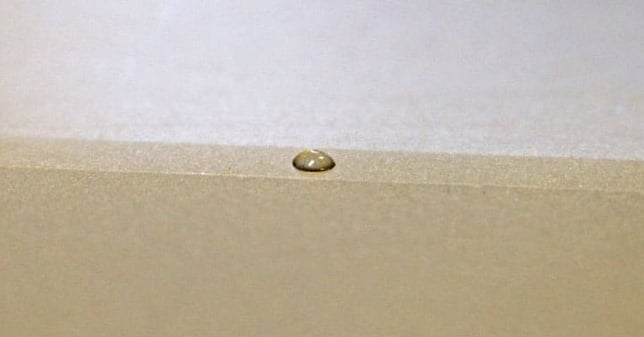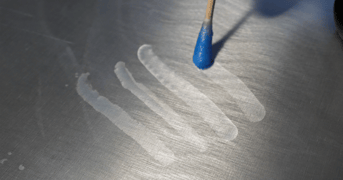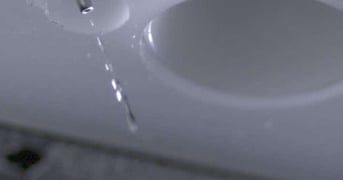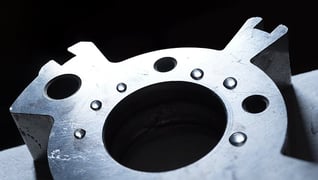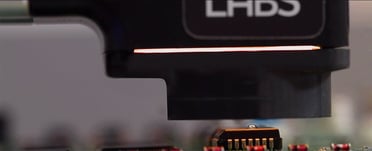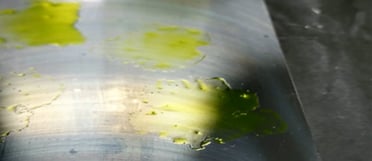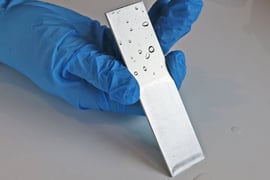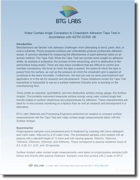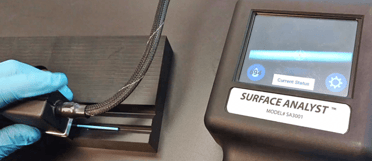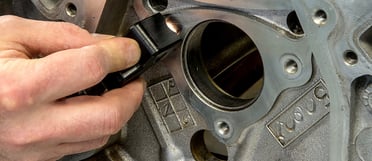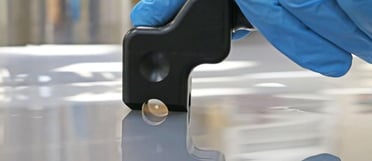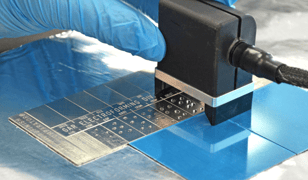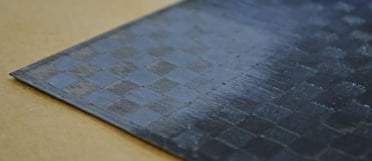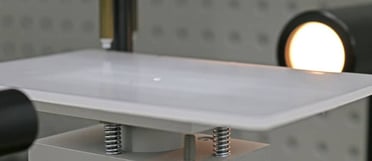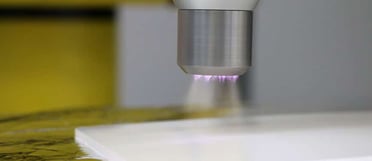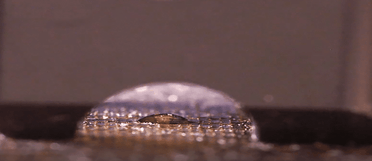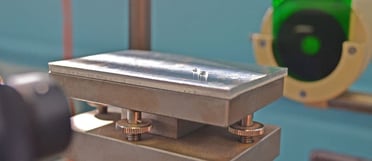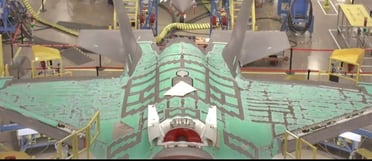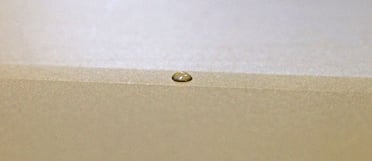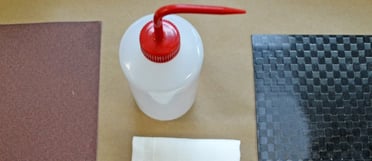Technical Paper: Gage R&R for Contact Angle Measurements
Because most Gage R&R methods do not account for within-part variability, a modified approach is needed to properly determine the repeatability and reproducibility of contact angle measurements across parts and across operators.
Read
Topics:
Posts by Topic
Surface Analyst vs. Dyne Inks: Which is the Better Solution for Surface Testing?
Technical Paper: Dyne Inks & Wetting Tension This paper explains how dyne inks compare to contact angle measurements obtained by the Surface Analyst.
Read
Topics:
The Surface Analyst's Innovative Method of Depositing Water to Measure Contact Angle: Ballistic Deposition
Discover how the Surface Analyst's unique method of depositing water onto a surface enables precision contact angle measurements on real-world surfaces. The forces acting on a liquid drop in contact with a surface can be represented as the surface energy of the solid, the surface tension of...
Read
Topics:
How Many Measurements Are Enough to Make Quality Decisions?
A surface that has been properly prepared for coating, painting, or adhesive bonding will have a certain average contact angle that is determined primarily by the chemical composition of the surface. Because of slight variations in the surface composition combined with the variation inherent in any...
Read
Topics:
Single Fluid Contact Angle Measurements Make Process Control Easier
Polar interactions between a properly prepared surface and an ink, adhesive, or coating are strong and are responsible for most of the required adhesion of inks, paints, and adhesives.
Read
Topics:
Utilizing Water Contact Angle Measurements to Predict Surface Preparedness for Dye Penetrant Application
Reliably predicting dye penetrant wettability for fluorescent crack inspections hinges on understanding surface cleanliness prior to penetrant application.
Read
Topics:
Rapid Development of Surface Treatment Processes for Bonding Dissimilar Materials
A recent concept in automotive lightweighting is that of the ‘joining of dissimilar materials.’ The purpose is to allow tailoring the materials in a structure so as to ensure that each part of the structure has the optimum mechanical properties and minimum weight. An example would be the bonding of...
Read
Topics:
Correlating Water Contact Angle With Water Break Measurements as an Indicator of Surface Energy
The water break test is a common pass/fail method used to evaluate surfaces for the presence of hydrophobic contaminants, which can be detrimental to the adhesion performance of paint or an adhesive. It is a qualitative means of evaluating surface energy, which is directly related to surface...
Read
Topics:
Water Contact Angle Correlation to Crosshatch Adhesion Tape Test in Accordance with ASTM D3359-09
Manufacturers are familiar with adhesion challenges when attempting to bond, paint, etch, or coat a substrate. Poorly prepared surfaces can undoubtedly produce problematic adhesion issues.
Read
Topics:
Rapid Evaluation of Surface Properties of Medical Tubing for Process Development and Quality Assurance
This paper is a joint creation between Brighton Science and Teleflex Inc., a prominent provider of medical devices such as medical tubing.
Read
Topics:
Control of Cleaning Processes to Maximize Sealant Performance
Cleanliness in automotive powertrain manufacture is critical for several reasons. Particulates generated in the various casting and machining processes must be effectively removed to prevent both the premature wear of sliding and rotating parts as well as the catastrophic failure of components such...
Read
Topics:
Novel Wetting Measurements for Rapid Quality Assurance of Surface Treatment for Adhesion on Polymers
This work presents the results of investigations into the ability of the ballistic drop deposition technique to measure surface treatment in the corona and flame-treated oriented polypropylene films.
Read
Topics:
Effect of Surface Roughness on Contact Angle Measurements Obtained with the Surface Analyst
A frequent question from people who use contact angle measurements to characterize surfaces and control manufacturing processes is, “What effect does surface roughness have on these measurements?” This is a valid question, especially when dealing with surfaces that have a range of textures...
Read
Topics:
Effect of Grit-Blasting on the Surface Energy of Graphite/Epoxy Composites
Composites consisting of polymer matrices reinforced with graphite fibers are attractive materials for structural applications in the aerospace industry because they are light in weight and have a high strength-to-weight ratio.
Read
Topics:
Water Contact Angle as a Quantitative Measure of Total Polyethylene Surface Energy
A wide variety of plasma treatments were performed on polyethylene surfaces, resulting in a wide range of total surface energies.
Read
Topics:
Contact Angle Measurements and Surface Analysis of Atmospheric Pressure Plasma Treated Polypropylene
The Surface Analyst™ rapidly obtains contact angle measurements from surfaces via Ballistic Deposition, whereby a small drop of liquid (usually water) is constructed in situ on the surface via a pulsed stream of nanoliter-sized droplets.
Read
Topics:
Progress in the Reliability of Bonded Composite Structures
This paper reviews research progress in the detection of contamination on surfaces for bonded composites.
Read
Topics:
The Surface Analyst: Advanced Goniometry for Manufacturing
There are fundamental differences between an NRL-style goniometer and the Surface Analyst, most of which contribute to the value of the measurement for the development and control of surface-sensitive manufacturing processes.
Read
Topics:
Qualification of Surface Processes for Bonded Aircraft Repair
This paper demonstrates how contact angle is an extremely sensitive and rapid method to check for surface cleanliness and consistency for aircraft repair.
Read
Topics:
Gage Repeatability and Reproducibility of the Surface Analyst
Gage Repeatability and Reproducibility are valued measures of a gauge’s appropriateness for use in a specific application.
Read
Topics:
Investigating the Impact of Solvent Wiping and Sanding Procedures on Surface Energy
Solvent wiping and sanding procedures can greatly affect the surface energy of a substrate. To investigate the surface energy differences following different preparation procedures of an epoxy/composite laminate, several different surface conditions were created utilizing different cleaning...
Read
Topics:

